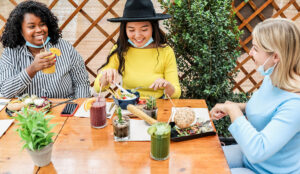Intuitive Eating with Food Allergies or Other Restrictions

Intuitive eating is a way to build a healthy relationship with food. This means not labeling foods as “good” or “bad,” and listening to your body’s hunger and fullness cues and trusting that they are right. It is not a diet, not about “perfection,” and not something that you can “fail” at. Intuitive eating can help you to learn to eat what your body tells you it wants; it is very different from “diet culture” which tells us we need to eat a certain food to look a certain way. People who have been on diets in the past could feel a sense of freedom with intuitive eating as they learn to trust their body’s signals.
However, having food allergies or a medical condition where you have to avoid certain foods or change your diet (e.g., lactose intolerance or celiac disease) can affect your relationship with food and make it so that it is challenging to eat intuitively. A lot of conversations may revolve around food, and a lot of the focus may be put on the foods that you must avoid. Intuitive eating can help heal your relationship with food and promote the idea that you know your body best and your body can be trusted.
Here are some tips to use intuitive eating to take the focus off of what you can’t have:
- Try focusing on the foods you can have and having a plan to help support you. For example, let’s say you have a nut allergy and are at a birthday party. All of your friends are eating the birthday cake, which is not nut-free. You brought your own nut-free dessert but are feeling left out because everyone is helping themselves to seconds of the cake that looks delicious. In situations like these, a lot of different feelings may come up—maybe some jealousy, sadness, or frustration. First of all, remember that navigating food allergies can be challenging. Also, you’re not alone—1 in 13 kids in the US have food allergies.
- Try to think of avoiding the foods you are allergic to as a form of self-care and listening to your body. Brainstorm ideas with an adult in your life for how you might be able to go into the situation more prepared. Maybe this means bringing more dessert so you are able to have seconds if you want them, bringing a few different food items so you have more options, or bringing allergy-free versions of the foods that your friends will be eating.
- Brainstorm positive things to help you cheer up in the moment if you get upset, such as “I am more than my allergy,” “This is what my body needs to keep me safe and be able to do all of the things that I love,” or “I can still have fun spending time with my friends today.”
- Give yourself full permission to eat the foods that are safe for you to eat and that you enjoy, remembering that there are no “good” or “bad” foods. Different foods serve different purposes, but they are all providing us with nutrients that our bodies need. When we don’t let ourselves have certain foods for non-medical reasons, we can develop strong cravings for these foods and we may think about these foods a lot. Are there any foods that you avoid or limit that you aren’t allergic to? If so, think about why you might be restricting these foods. Is it because of an internal cue (from your body) or an external cue (e.g., something you heard or read about)?
- Identify any food rules you might have, such as “don’t eat after a certain time,” only eat this, never eat that, and recognize that these rules can be harmful. They can bring negative, judgmental thoughts and feelings of guilt. By giving yourself full permission to eat them, you are taking the power away from the food and giving it back to yourself. Working with a dietitian, doctor, and mental health provider can help you to explore your relationship with food and to find what works for your unique body and self.
- Explore what foods satisfy you. Consider flavors, scents, textures, temperature, appearance, and eating environment when deciding what will bring you the most satisfaction. If possible, trying various brands/types of allergen-free versions of the foods you enjoy can help you find the ones you like best. Ask your parents if you can help cook some of these foods and have fun getting creative.
Eat the foods that taste good to you and make your body feel good. All bodies are unique and eating is not a “one-size-fits-all.” What feels right for one person and works for them might not be what someone else needs. You can work with your body to choose foods that make you feel good by listening to your internal cues. What foods help you to feel energized, content, happy, or satisfied? By listening to your body’s signals and avoiding the foods that cause an allergic reaction or damage to your digestive system (e.g., celiac disease), you are taking care of your body and honoring your health.

